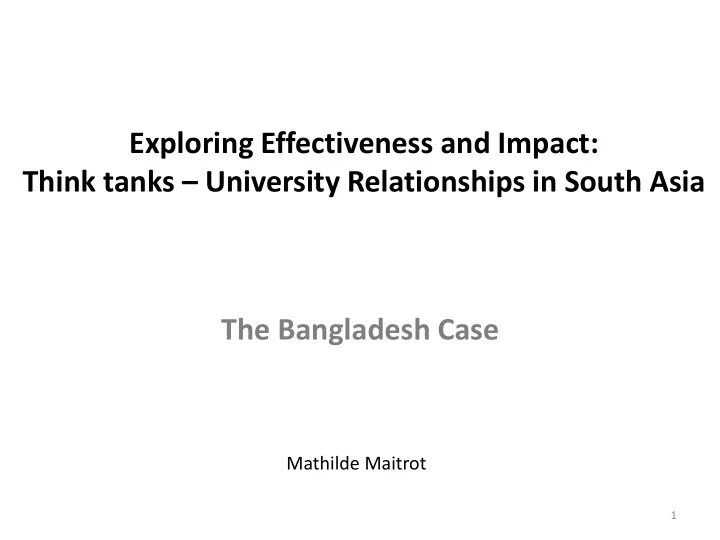

Exploring Effectiveness and Impact: Think tanks – University Relationships in South Asia The Bangladesh Case Mathilde Maitrot 1
MAIN RESEARCH QUESTION AND OBJECTIVES What are the relationships between think tanks and universities in Bangladesh and how do they influence policy? Objectives 1- to understand within the context, what issues encourage or discourage certain forms of relationships 2- to explore the complex relationships between knowledge creation and policy-making. 2
GOVERNANCE IN DEVELOPMENT DISCOURSE • Market-based liberalization focus • 1990s: Good governance • Civil society (NGOs and think tanks) • National governments (PRSPs and MDGs) Democratization 3
KEY CONCEPTS • Think tanks: “Non -governmental, not-for profit research organisations with substantial organisational autonomy from government and from societal interests such as firms, interest groups, and political parties” ( McGann and Weaver, 2011). • “Universities have always been keepers and creators of knowledge. They have sought to prepare new generations with the skills, cultural and scientific literacy, flexibility and capacity for critical inquiry and moral choice necessary to make their own contributions to society.” ( Birgeneau, 2005). 4
INITIAL ANALYTICAL FRAMEWORK 5
METHODOLOGY In Bangladesh: • Are universities really architects? • Are think tanks really contractors? • Qualitative approach • No landscaping study • 21 in-depth interviews of selected senior researchers and public figures in the civil society • Dhaka-centered (potential bias) • Political unrest 6
DISCUSSION OF FINDINGS 1 UNIVERSITIES LANDSCAPE IN BANGLADESH • 76 private and 34 public universities with different core mission and challenges “Teachers from public universities, of course do not receive enough funding from their universities to Universities, as institutions do: conduct research so they engage in • Private/public differences teaching but not in public • universities, they take some jobs in Have faculty capacities the private universities to • Some research (originality? Quality?) supplement their income. It is not • Have low funding capacities one, not two but three sometimes. • And you will find that universities Face internal political challenges advertise that they have public • Research “inertia” university teachers.” Knowledge 7 society
Civil Society DISCUSSION OF FINDINGS 2 TT LANDSCAPE IN BANGLADESH • 35 think tanks- loosely defined “Think tanks in Bangladesh, • Centralized in Dhaka unlike other research institutes from outside Bangladesh cannot • Highly dependent on donor funding follow a clear research plan • Think tanks, as institutions do: because they have insecure • Project research funding. They bid for research • Publications (weak review systems- a few projects funding and then decide outliers) to conduct the project for the funder” • Policy advocacy (dialogues, conferences, media events) • Trainings and seminars • Heavily influenced by diverse demand forces (donors and governments) • Struggling to maintain autonomy • Analytical capacity? 8
DISCUSSION OF FINDINGS 3 UNIVERSITIES AND TT RELATIONSHIPS “Political loyalism is a key element within our public universities. Recruitment, Drivers to relationships between promotion and posting, everything is think tanks and universities happening based on loyalism. So the – From university staff: exposure, quality of the knowledge suffers and we commissioned-projects, research are not investing in research. […] People interest, financial incentive who have the quality and the intention of strategy of multiple affiliations (with create knowledge go outside, for their think tanks and universities) livelihood and for their knowledge hunch also. So private sector and development sector give them opportunities. As a result – From think tanks’ perspective: knowledge production is not expertise, status and recognition institutionalized.” and potential recruitment Commercialization of knowledge production? 9
UNIVERSITIES AND THINK TANKS RELATIONSHIPS • Main characteristics of relationships: – Based on individuals’ personal connections – Mutual benefits – Members of board of research – Research input (methodology, data analysis or paper review) – Conference guest speaker / public advocate • Barriers to and opportunities for effective/more collaboration: – Lack of core funding (sufficient, predictable and untied autonomy) – Institutional barriers at university level (bureaucracy, conflicts, finance) – Need for more vision and leadership (possible conflict of interest at the advocacy level-competition) – Need for more autonomy and coherent investment in research capacities in relation to think tanks’ mission 10
ANALYTICAL DIAGRAM Knowledge Policy society Civil Society 11
IMPLICATIONS FOR KNOWLEDGE PRODUCTION AND POLICY MAKING “In most of the cases the think tanks are – Fragmentation trying to draw media attention because we – Output-focused think tanks think that policy advocacy is very useful, I – Lack of ownership think sometimes this is misguided. Think – Goal displacement tanks try hard to hit the headlines of the – Consultancy type institutions newspapers rather than the content of the research”. – Projectization of knowledge production – Low longer-term strategic investment in “These mechanisms do not create research capacities institutions, does not create sustained – Low autonomy capacity, so in order to have – Low institutionalization of the knowledge institutions with sustained capacity, production and policy-making process you need to have built that institution – Development of research wings under with a proper portfolio with university umbrella (think tank function) appropriate predictable funding ” Weak “ think ” Weak “ tanks ”? 12
Thank you 13
Recommend
More recommend